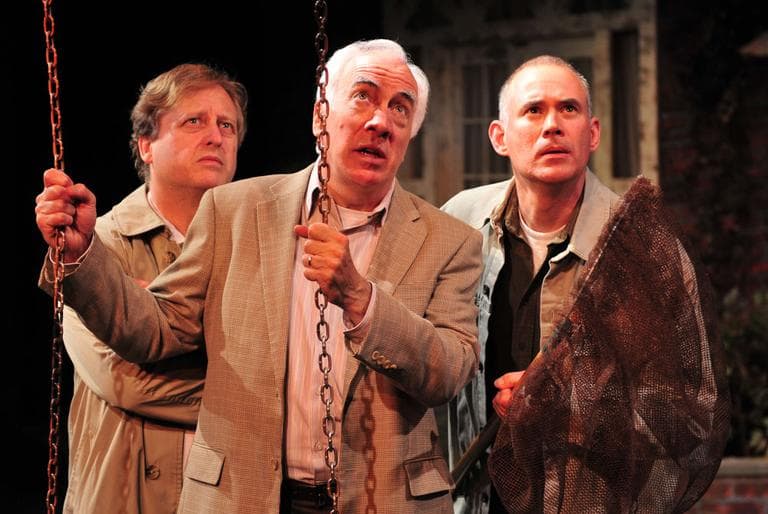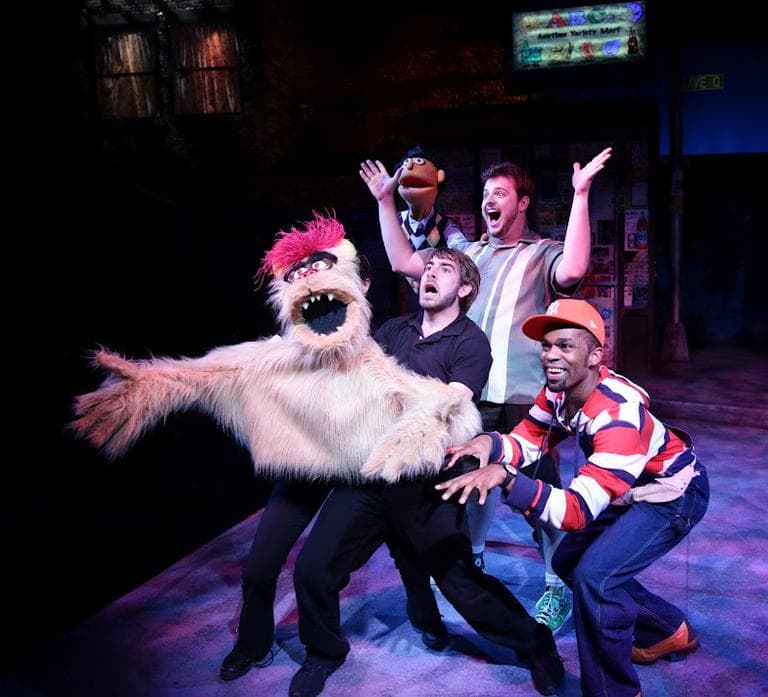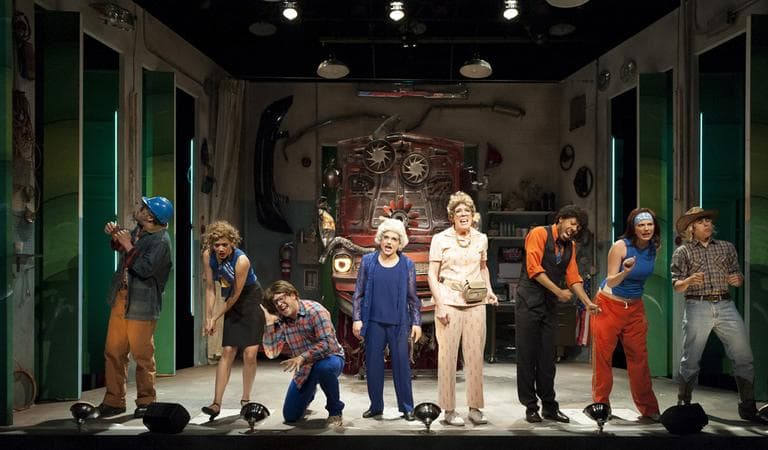Advertisement
Gloucester Stage Plants A Glorious 'Garden'

A great ensemble isn’t merely a collection of wonderful actors. When you see a first-class ensemble it’s almost impossible to tell where one performance begins and another ends — almost as if the whole cast is synchronized to a single pulse. If you got to SpeakEasy’s “The Divine Sister” or Whistler in the Dark’s “Dogg’s Hamlet, Cahoot’s Macbeth,” you know what I’m talking about.
Let’s not dwell in the past, though, with such stellar examples going on right now, including Alan Ayckbourn’s “Round and Round the Garden” at the Gloucester Stage Company (through July 1).
Ayckbourn’s is the third in a British trilogy, “The Norman Conquests,” made famous in the States by a PBS telecast with Tom Courtenay. The well-received recent revival transferred to New York in 2009.
But no comparisons are necessary. The Gloucester cast — all but one of them appeared here in the previous parts the past two seasons — makes you think the plays were written for them even though they’re clearly Yanks affecting British accents. And mostly Boston Yankees at that, which perhaps accounts for why local productions often produce such fine ensemble work — Steven Barkhimer, Sarah Newhouse, Barlow Adamson and Adrienne Krstansky (taking over for Jennie Israel) — all know each other from their work together in any number of excellent local productions. And joining the fun once again, is Lindsay Crouse.
Ayckbourn’s clever concept is to pit three couples (more or less) against each other in three plays unraveling simultaneously (more or less), each in a different physical space — “Table Manners” in the dining room, “Living Together” in the living room and “Round and Round the Garden” in, all together now, the garden.
The actor who’s really first among equals is Barlow Adamson, whose graceful ineptitude should be bottled ... He shows what a special resource he is in Boston theater.
Gloucester has set itself the formidable task of staging them a year apart, making it all the more difficult to maintain momentum. In fact, after a riotous “Table Manners” two summers ago, “Living Together” fell a bit flat last season. But “Round and Round the Garden” sets the course straight again. As it opens, Annie (Newhouse), who lives at home with her offstage mother, meets Norman (he of the conquests) in the garden as they’re about to go away for a weekend of sexcapades.
Problem is that Norman (Barkhimer) is married to Annie’s sister, Ruth (Krstansky). And Annie has had her eye on the painfully shy and easily bamboozled local veterinarian, Tom (Adamson). Adding to the confusion are Annie’s brother, Reg (Snee), and his prim wife, Sarah (Crouse), who finds out about the tryst and calls Ruth to come collect her philandering husband.
The women have the best lines – putting the men who are either too libidinous or not libidinous enough in their place. But the men have the most physical fun — Snee staring open-mouthed at Barkhimer’s suggestion to give up their middle-class lives and “touch earth together” is priceless. Barkhimer is hilarious in whatever pose, but the actor who’s really first among equals is Adamson, whose graceful ineptitude should be bottled. Fixing a chair or putting the moves on Ruth, after mistaking her intentions, he shows what a special resource he is in Boston theater.
Advertisement
The director, or ringmaster, is Eric Engel, who runs the Gloucester facilities (soon, hopefully, to be expanded) and is clearly having as much fun as the actors. Jenna McFarland Lord’s smart sets are crucial to Gloucester Stage’s personality and this one — grass and landscaping that, like the house, have seen better days — is no exception.
The debate over Ayckbourn has always been whether he is a major playwright — a farceur with Pinteresque overtones — or the British Neil Simon. I lean more to the latter analysis and nothing in the Gloucester productions makes me feel otherwise. (My colleague, Ben Brantley, felt the opposite after seeing the Circle in the Square trilogy.)
I’m not complaining, though. I’m laughing too hard to complain.
'Avenue Q'

In the Lyric Stage Company of Boston’s “Avenue Q” (through July 1) it’s even harder to tell where one performance begins and another ends, which is something of a necessity when about half the cast are puppets controlled by actors.
Again, this is a case of the director being the guy who runs the joint and no local artistic director gets more out of his space than Veloudos, particularly when it comes to chamber musicals. This “Sesame Street” sendup, with characters you’ll never see on PBS, like Lucy the Slut, has played locally as part of the Broadway in Boston series. But here also, no comparisons are necessary, given a cast that so thoroughly inhabits the characters, both human and otherwise.
The story revolves around an apartment building of people (and cuddly monsters) who aren’t exactly part of the mainstream – unemployed and underemployed young interspecies lovers, a closeted Republican Muppetlike accountant (remember the religious right’s furor over Bert and Ernie?), and a stereotypical Chinese woman and her Jewish fiancé (two of the human cast members). Oh, and Gary Coleman, the building superintendent who looks nothing like the late child star.
They get together to impart words of wisdom to buck each other up, not unlike the PBS Show, but here the songs, while celebrating diversity, also put down any hint of politically correct goo-goo. Still, the songs are so clever and the mood so upbeat that the most PC among us can go home singing “Everyone’s a little racist, aren’t you?”
Veloudos has assembled a wonderful cast and with help from Ilyse Robbins’ exuberant choreography and the Puppet Showplace Theatre’s Roxanna Myhrum’s expert coaching, “Avenue Q” fits just as well into its Boston neighborhood as the original in New York. Little wonder that it’s the Lyric’s most popular show in history.
'Car Talk: The Musical!!!'

BOSTON — Just as the Magliozzi Brothers announce their retirement from public radio along comes a new incarnation of the Marxist mechanics (as in Groucho, not Karl). The brothers are not, though, the architects of this appropriately jocular, home-grown ode by Wesley Savick (books, lyrics and direction) and Michael Wartofsky (music).
“Car Talk: The Musical!!!” (through Aug. 12 at the Central Square Theater) does not live in the same exalted air space as “Avenue Q.” Savick’s writing is always clever, but it never upends expectations in the way that great parodies like “Avenue Q” or “Forbidden Broadway” do. If anything, he panders a bit in his easy digs at working-class shlubbery. One of the pleasures of the radio program is its ability to get past class differences as Tom and Ray go toe to toe with the unaccented as well as the unwashed. Everyone’s a little bit inept, aren’t you?
That said, Savick and Wartofsky score on just about every other note, from lighthearted Broadway parodies (“Life is a Chevrolet, old chum”) to utilizing the basic story of “The Wizard of Oz.” “Car Talk,” in fact, has become “The Wizard of Cahs,” with a beat-up car somehow inhabited by the two brothers dispensing advice. When they get tired of it they refuse to answer questions until their great riddle based on the Riddle of the Sphinx.
This isn’t an ensemble work in the sense of the other two as there’s a clear hierarchy of characters, starting with Boston’s best musical singer, Leigh Barrett, as the lovelorn Sheila, who has the hots for fellow office worker Rusty Fenders (Scott H. Severance). But Rusty only has eyes for his ’93 Kia. Barrett-ophiles have long suspected she could sing the phone book; here she comes close to singing Automotive Digest — and singing it beautifully — in one of Wartofsky’s and Savick’s better original songs.
Severance and Maureen Keiller, in a witty Margaret Hamilton knock-off as their boss, are the other stars, but the young ensemble gives one hope for the future of Boston musical theater, most notably Tiffany Chen, who plays Miatta C. LaChassis, Rusty’s fantasy car, as if to satirize Madison Avenue’s sexualization of the auto industry. And Chen, a fine singer and dancer, is duly sexy — she could go straight to Lola in “Damn Yankees” without passing go.
As in “Avenue Q,” the choreography (Michelle Chasse) and music direction (Scott Nicholas) are superb. If Savick goes a little overboard with Boston accents you can’t blame him. I can’t stop myself from saying “Cah Tok’s a winnah."
This program aired on June 21, 2012. The audio for this program is not available.
